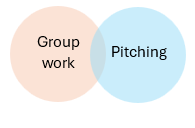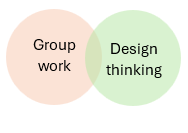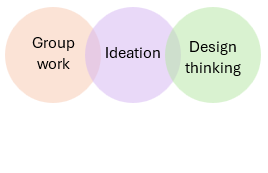This last step is about the strategy of entering the market and then growing. It teaches you how to identify your low-hanging fruit or the most suitable segment where to start.
Bachelor

1ZEUA0 – New product marketing – 5 ECTs – Q1 – Introductory
How can a firm increase the likelihood of new product success? This course provides the answer; it provides an overview of the most important theories, models, and concepts in new product marketing. You will learn how customers with similar needs can be bundled into segments and how firms identify target markets and analyze which are most profitable.

0SV30 – Economics of innovation: introduction – 5 ECTs – Q1 – Introductory
This course is an introduction to the economic approach to innovation. Innovation is the outcome of a complex process where different economic agents, from producers to consumers to suppliers interact with specific incentives and goals. This course discusses the basic concepts and models developed by economists to recognize and measure different forms of innovation, to describe the incentives of private companies to innovate, to identify different consequences of innovation for economic systems.

0SV60 – Economic policy – 5 ECTs – Q4 – Introductory
How can policy stimulate innovation? This course provides students with theoretical and practical insights into why and when policy measures are necessary, how they can be pursued, and how they relate to innovation processes. We further build on the microeconomic theory from 0SV30 to emphasize policy interventions, in contrast to a pure market process, and introduce the concept of market failure. Furthermore, we discuss the impact of economic interventions and regulations on the market. Important concepts in the course are economic rationality and social welfare, the theory of perfect competition, market failure, regulation and competition policy.

0SV70 – Economic policy in practice: social cost-benefit analysis – 5 ECTs – Q1 – Deepening
Social cost benefit analysis (SCBA) is used as a standard methodology to evaluate economic policy in, e.g. large infrastructural projects. With SCBA, policy makers can evaluate in a quantitative manner economic policy based on examining the social costs and benefits. In contrast to private cost benefit analysis, a number of different variables have to be taken into account (social discount rate, different time horizon of discounting, different way of calculating the social benefits).
Master

1ZM16 – Managing innovation processes – 5 ECTs – Q1
As such, the most important strategic and tactical planning and implementation decisions will be covered that are required to successfully develop and launch new products. Research on making these decisions has proceeded in many academic fields, such as operations management, engineering, marketing, quality management, technology management, organizational behavior and strategic management, with incomplete links across those fields.

1ZM65 – System dynamics – 5 ECTs – Q4
Environmental stress and accelerating economic, social, and technological changes challenge managers and policymakers to learn how to design and manage high-leverage and robust strategies and policies. Thus, it is a growing requirement for us to learn how to design and manage complex systems with multiple feedback effects, long-time delays, and nonlinear responses to our decisions. However, learning in such situations is tough since we often don't face the full consequences of our decisions.

0HM220 – Network society – 5 ECTs – Q2
The course introduces theories and techniques of social network analysis and discusses their application to questions of technology adoption and use and innovation in general. Network analysis focuses on relationships between or among social entities (which can be individuals and/or organizations). It is widely used in the social and behavioral sciences, as well as in economics, organizational studies, and industrial engineering.

1ZM120 – Entrepreneurial marketing – 5 ECTs – Q2
In the course, we will discuss concepts such as principles of affordable loss, experimentation, and adjustment for emerging opportunities, as well as cooperation with first customers. Entrepreneurial Marketing provides a vital guide to successfully developing customer demand and a market for innovative new products.